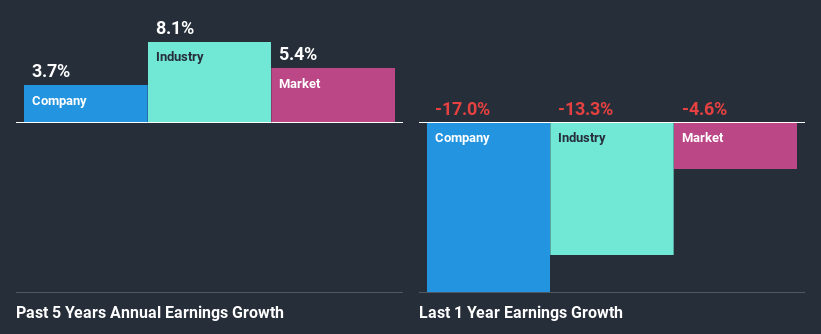- Japan
- /
- Infrastructure
- /
- TSE:9367
Daito Koun Co., Ltd.'s (TYO:9367) Stock Has Shown A Decent Performance: Have Financials A Role To Play?

Most readers would already know that Daito Koun's (TYO:9367) stock increased by 2.5% over the past three months. As most would know, long-term fundamentals have a strong correlation with market price movements, so we decided to look at the company's key financial indicators today to determine if they have any role to play in the recent price movement. Specifically, we decided to study Daito Koun's ROE in this article.
Return on equity or ROE is a key measure used to assess how efficiently a company's management is utilizing the company's capital. In short, ROE shows the profit each dollar generates with respect to its shareholder investments.
Check out our latest analysis for Daito Koun
How To Calculate Return On Equity?
The formula for ROE is:
Return on Equity = Net Profit (from continuing operations) ÷ Shareholders' Equity
So, based on the above formula, the ROE for Daito Koun is:
8.2% = JP¥540m ÷ JP¥6.6b (Based on the trailing twelve months to December 2020).
The 'return' is the profit over the last twelve months. Another way to think of that is that for every ¥1 worth of equity, the company was able to earn ¥0.08 in profit.
What Is The Relationship Between ROE And Earnings Growth?
So far, we've learned that ROE is a measure of a company's profitability. Based on how much of its profits the company chooses to reinvest or "retain", we are then able to evaluate a company's future ability to generate profits. Assuming everything else remains unchanged, the higher the ROE and profit retention, the higher the growth rate of a company compared to companies that don't necessarily bear these characteristics.
Daito Koun's Earnings Growth And 8.2% ROE
At first glance, Daito Koun seems to have a decent ROE. On comparing with the average industry ROE of 5.0% the company's ROE looks pretty remarkable. However, for some reason, the higher returns aren't reflected in Daito Koun's meagre five year net income growth average of 3.7%. That's a bit unexpected from a company which has such a high rate of return. Such a scenario is likely to take place when a company pays out a huge portion of its earnings as dividends, or is faced with competitive pressures.
As a next step, we compared Daito Koun's net income growth with the industry and were disappointed to see that the company's growth is lower than the industry average growth of 8.1% in the same period.

The basis for attaching value to a company is, to a great extent, tied to its earnings growth. What investors need to determine next is if the expected earnings growth, or the lack of it, is already built into the share price. This then helps them determine if the stock is placed for a bright or bleak future. One good indicator of expected earnings growth is the P/E ratio which determines the price the market is willing to pay for a stock based on its earnings prospects. So, you may want to check if Daito Koun is trading on a high P/E or a low P/E, relative to its industry.
Is Daito Koun Efficiently Re-investing Its Profits?
Daito Koun has a low three-year median payout ratio of 20% (meaning, the company keeps the remaining 80% of profits) which means that the company is retaining more of its earnings. However, the low earnings growth number doesn't reflect this as high growth usually follows high profit retention. So there might be other factors at play here which could potentially be hampering growth. For example, the business has faced some headwinds.
Additionally, Daito Koun has paid dividends over a period of at least ten years, which means that the company's management is determined to pay dividends even if it means little to no earnings growth.
Summary
Overall, we feel that Daito Koun certainly does have some positive factors to consider. Although, we are disappointed to see a lack of growth in earnings even in spite of a high ROE and and a high reinvestment rate. We believe that there might be some outside factors that could be having a negative impact on the business. While we won't completely dismiss the company, what we would do, is try to ascertain how risky the business is to make a more informed decision around the company. To know the 1 risk we have identified for Daito Koun visit our risks dashboard for free.
If you’re looking to trade Daito Koun, open an account with the lowest-cost* platform trusted by professionals, Interactive Brokers. Their clients from over 200 countries and territories trade stocks, options, futures, forex, bonds and funds worldwide from a single integrated account. Promoted
New: Manage All Your Stock Portfolios in One Place
We've created the ultimate portfolio companion for stock investors, and it's free.
• Connect an unlimited number of Portfolios and see your total in one currency
• Be alerted to new Warning Signs or Risks via email or mobile
• Track the Fair Value of your stocks
This article by Simply Wall St is general in nature. It does not constitute a recommendation to buy or sell any stock, and does not take account of your objectives, or your financial situation. We aim to bring you long-term focused analysis driven by fundamental data. Note that our analysis may not factor in the latest price-sensitive company announcements or qualitative material. Simply Wall St has no position in any stocks mentioned.
*Interactive Brokers Rated Lowest Cost Broker by StockBrokers.com Annual Online Review 2020
Have feedback on this article? Concerned about the content? Get in touch with us directly. Alternatively, email editorial-team (at) simplywallst.com.
About TSE:9367
Flawless balance sheet established dividend payer.
Market Insights
Community Narratives



